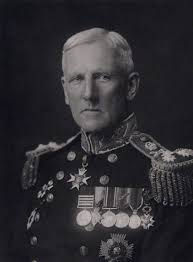A moving memorial service for an outstanding captain
- Shaun Lewis
- Nov 2, 2019
- 3 min read
Yesterday, I was privileged to attend the memorial service at the Old Naval College, Greenwich, for my old captain in HMS Plymouth, Captain David Pentreath, CBE DSO. It was a wonderful service with hundreds of people attending, including most of my fellow officers from 1982, one of whom I had not seen for over 37 years. He was a very fine man, naval officer and gentleman, and all who served under his command have nothing but absolute respect and admiration for him.
The following is an extract from his obituary in The Times concerning his service in the Falklands War.
"Captain David Pentreath messaged Lieutenant-Commander Alfredo Astiz of the Argentine navy explaining that, if he did not surrender, Pentreath would shell the cliff behind his camp on South Georgia so that an avalanche of rocks would land on it. Eventually concluding that this was not worth the risk, the Argentine officer capitulated.
Astiz came aboard Pentreath’s frigate, HMS Plymouth, on April 26, 1982, to formally surrender his men, part of the occupying force that had seized control of South Georgia on April 3. Although Astiz was known as the Blond Angel of Death because of the barbaric acts he had carried out against thousands of his own people, he was charm itself to the crew of Plymouth and turned out to have an exceptional knowledge of English.
Escorted by a Royal Marine clutching a gun, Astiz was brought down from the executive officer’s cabin to sign the surrender document in the wardroom while Pentreath sat opposite. The photograph of that scene became one of the iconic shots of the conflict. As for Astiz, in 2011 he was jailed for life by a court in Argentina for crimes against humanity during the military rule of 1976-83.
Plymouth had been heavily involved in the battle for South Georgia. She was among the first warships to arrive in the South Atlantic after the Argentine invasion and one of a handful tasked with reclaiming the island. The frigate accompanied HMS Antrim in bombarding enemy positions on April 25, firing 129 shells from her 4.5in guns before Marines and special forces were put ashore. Argentine troops across the island soon realised that they were up against a superior enemy and caved in.
After briefly acting as a prison ship for captured forces Plymouth sailed to the Falkland Islands, where she was one of the conflict’s naval workhorses. Pentreath stood on a darkened bridge as she was the first ship to enter San Carlos Water on the night of May 20, escorting landing craft to the beaches then providing air-defence support for the amphibious assault.
On June 8 Plymouth had been sent to shell an enemy observation point on West Falkland when lookouts spotted five Argentine Mirage jets on the horizon. Seeing Plymouth alone and outside the relative safety of San Carlos Water, the aircraft turned and homed in at low altitude. Swiftly Pentreath issued the emergency order of “full ahead”, then weaved the course of his ship in an attempt to evade the attack. Plymouth shot down two of the Mirages and damaged two more, but was hit by four 1,000lb bombs. Remarkably none exploded, probably because they were released too low for the fuses to arm, but one struck a primed depth charge.
“The bombs bounced over the ship and across the flight deck, to the astonishment of the anti-submarine warfare mortars crew, who were crouching within feet of annihilation,” Pentreath recalled. “The ship returned to the anchorage at full speed, with thick clouds of brown smoke pouring over the flight deck a sure sign to consorts that she was in trouble.” Fires raged below decks for more than an hour and five injured sailors were taken off the frigate by helicopter.
Pentreath was a measured and compassionate man with a stubborn streak whose assured, cool-headed authority was magnetic. A gifted ship-handler, he could spin his frigate around the ocean as though it were a Lamborghini.
Affectionately known as “eagle eyes” by his men, Pentreath toured the decks daily, checking morale and explaining the developing battle to the 236-strong ship’s company. In Britain his wife, Judy, supported the sailors’ families, and used her talents as a potter to make each Plymouth sailor a mug.
After confirmation of the final unconditional surrender of the Falklands by Argentina, Plymouth, patched up and back on the gun line, was the first British warship to enter Port Stanley on June 17. She returned to an ecstatic welcome at Royal Naval Dockyard Rosyth on July 14, after which Pentreath was awarded the Distinguished Service Order for his role in the campaign. He posted a photocopy of the Astiz surrender document to the Ministry of Defence, then framed the original and hung it in his study."







Comments